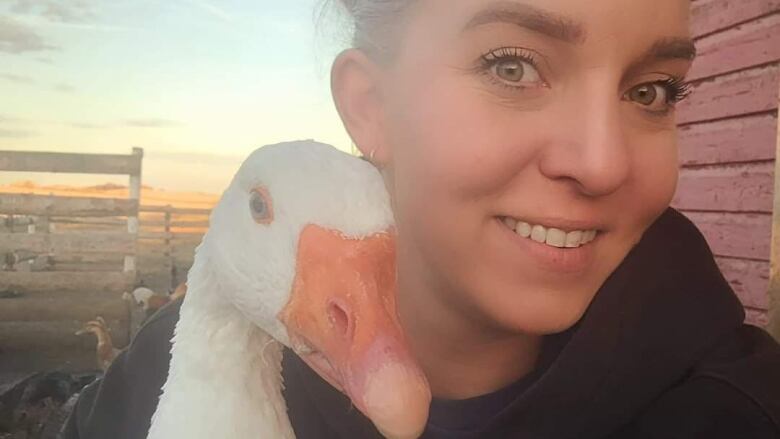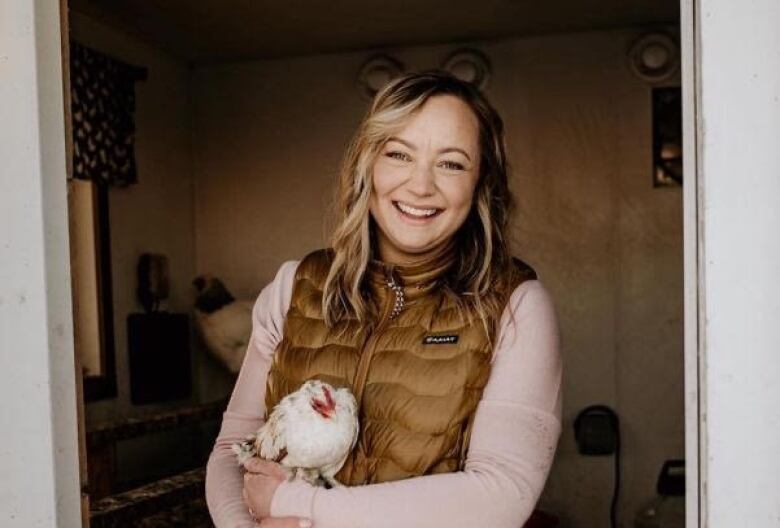'Heartbreaking' loss as avian influenza hits backyard chicken flocks in Alberta
Vet says spread of virus is 'unprecedented'

Molly Kulczycki says watching her flock slowly dwindle was "heartbreaking."
Kulczycki, who lives in the county of Two Hills, Alta. recently lost all of her backyard ducks, chicken and geese to the deadly avian influenza.
Kulczycki's first bird became sick on May 6, which she then put into isolation. That bird died, and the next day her turkeys became sick.
"We kind of carried on with the day and there were more birds sick and more birds dying on me. And on Mother's Day, I actually lost eight birds in four hours," she said.
She reported the deaths and went through the testing process with the Canadian Food Inspection Agency every bird was sick or had avian flu symptoms.
"They came with a culling team and put the remainder of the birds down," she said.
"It was heartbreaking because all of these birds, except for four, were right out of the egg, and there was nothing I could do to help them. I just watched them get sick and suffer," she said.
She says she even took some of the birds camping with her years ago and considered them pets.
I just didn't think it would happen.-Molly Kulczycki, small flock owner in Alberta
Kulczycki saysshe thought because her flock was small it wasn't likely to happen to her, and she's warning other backyard flock owners not to make the same mistake.
"I just didn't think it would happen. I thought it was more of a large poultry producer problem, not a small flock owner problem."
Canadian poultry producers have lost more than a million birds to the highly transmissible variant of avian flu that has taken a toll on flocks across the country. The strain of avian influenza currently affecting chicken and turkey farmers throughout North America can be spread easily by both wild and domestic birds.
This level of spread is "unprecedented," says Teryn Girard, a poultry veterinarian in Alberta who works in clinics in Red Deer and Lethbridge.

As of Friday, there have been 10 outbreaks in non-commercial operations in Alberta, Girard says.
"We prepare for this every year as veterinarians, but it hadn't been diagnosed in Alberta before.Every new case still is not what you want to hear," she says.
"There's a lot more information going around and I think people are definitely taking it more seriously now."
Just three months ago the City of Calgary's new urban hen licensing program began.
Girard says it's possible the outbreak could dissuade some people from getting into what is a growing hobby, but even with the spreadshe believes backyard chickens can still be safely managed.
Raising backyard chickenshas become hugely popular in Alberta, due to the pandemic and food security concerns, says Cassandra Kirkpatrick, small flock urban hen program facilitator at Alberta Farm Animal Care.

Kirkpatrick, who lives near High River, Alta., says she's working to educate people about how to keep their flocks safe through the program, which works across the province, including in Calgary.
"We're just running off our feet trying to provide all these workshops to these different areas and just help get the information out there."
Kirkpatrick says avian influenza is a concern as outbreaks continue.
"We're seeing outbreaks all across the country and of course they're getting higher and higher in Albertathere is no treatment, there's no vaccine, there's nothing you can do once it's in your flock," she says.
However, Kirkpatricksays there are several biosecurity steps and preventative measures she's taking, and recommends others take, to prevent the spread of avian influenza.
"One of the best things we can do is avoid wild bird contact. This includes keeping our birds inside their coop and their run and not letting them free range keeping them contained, keeping our coop clean."
She has also restricted visitors to the coop, uses just one pair of boots inside the coop and will not be bringing any new birds into her flock for the time being.
With files from the Canadian Press, Wallis Snowdon












_(720p).jpg)


 OFFICIAL HD MUSIC VIDEO.jpg)
.jpg)



























































































